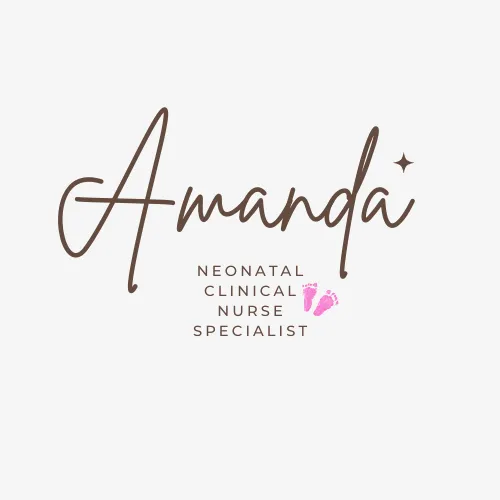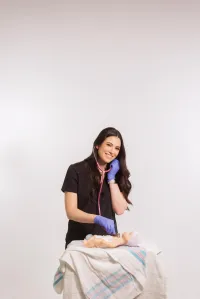
Welcome to Amanda's NICU Education

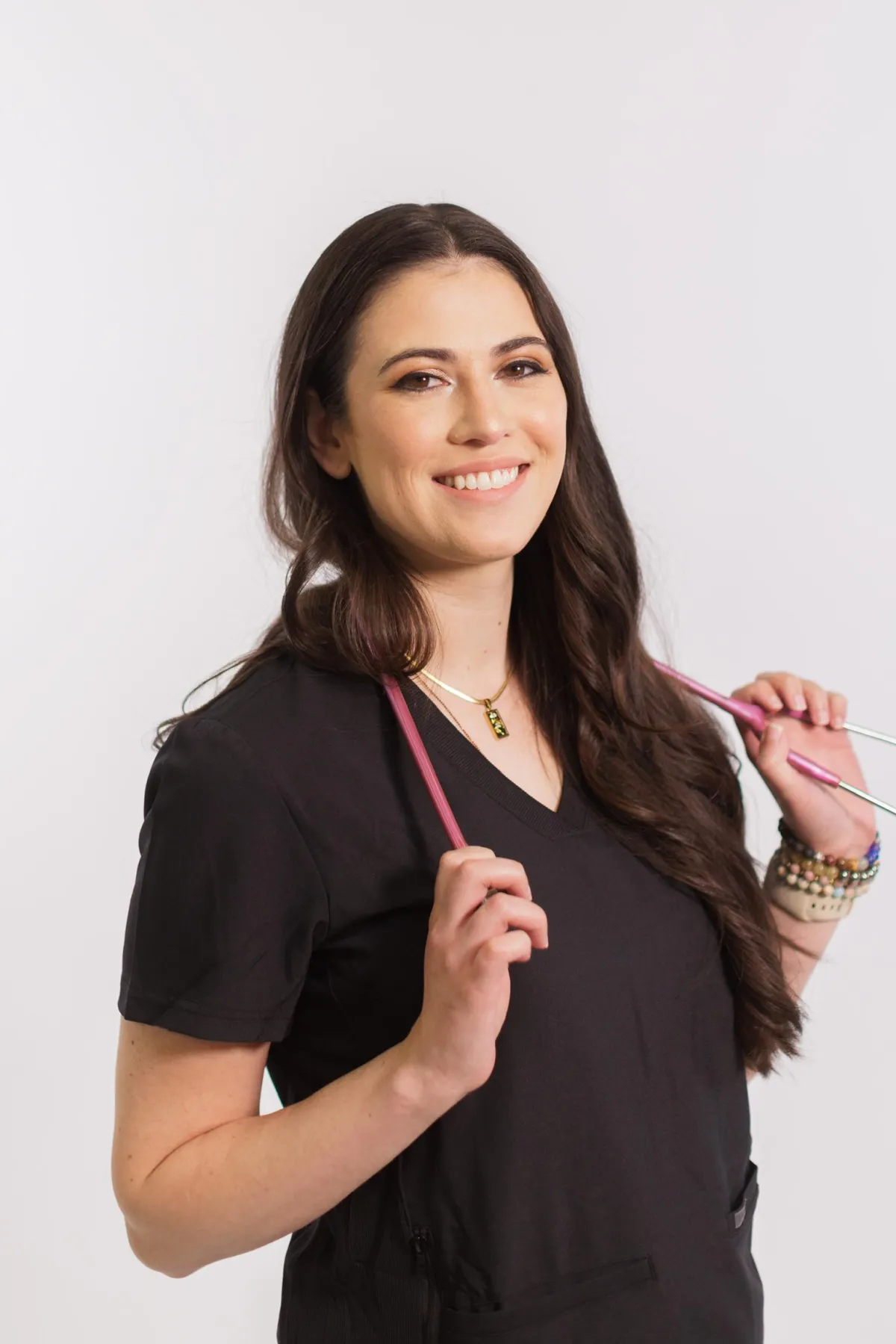


Hi! My name is Amanda. I'm a NICU nurse, Clinical Nurse Specialist, NICU Educator... basically your NICU BFF. If you want to talk NICU, I'm here for you! I love everything about NICU nursing and I'm eager to learn and share my knowledge with all my NICU friends.
I have been a NICU nurse since 2009 I am currently a Clinical Nurse Specialist in a Level IV NICU in Los Angeles.
I am passionate about educating the next generation of NICU nurses. I share my knowledge through platforms such as Instagram and Facebook and am excited to have you here on my website!
Click on the button below to sign up for my newsletter filled with NICU education and tips for all experience levels.

Not very many people love taking tests but as a self-acclaimed "forever student" who has taken (and passed) five different certification exams I am no longer afraid of tests! "Way to brag", you might be thinking but I want to help YOU pass your certification exam too!
Introducing Amanda's RNC-NIC Success digital course - your ultimate study companion!
Gain unlimited, on-demand access for life, ensuring you're primed to ace your certification exam.
I'm here to help you succeed and I can't wait for you to share with me that you PASSED the RNC-NIC EXAM!!!









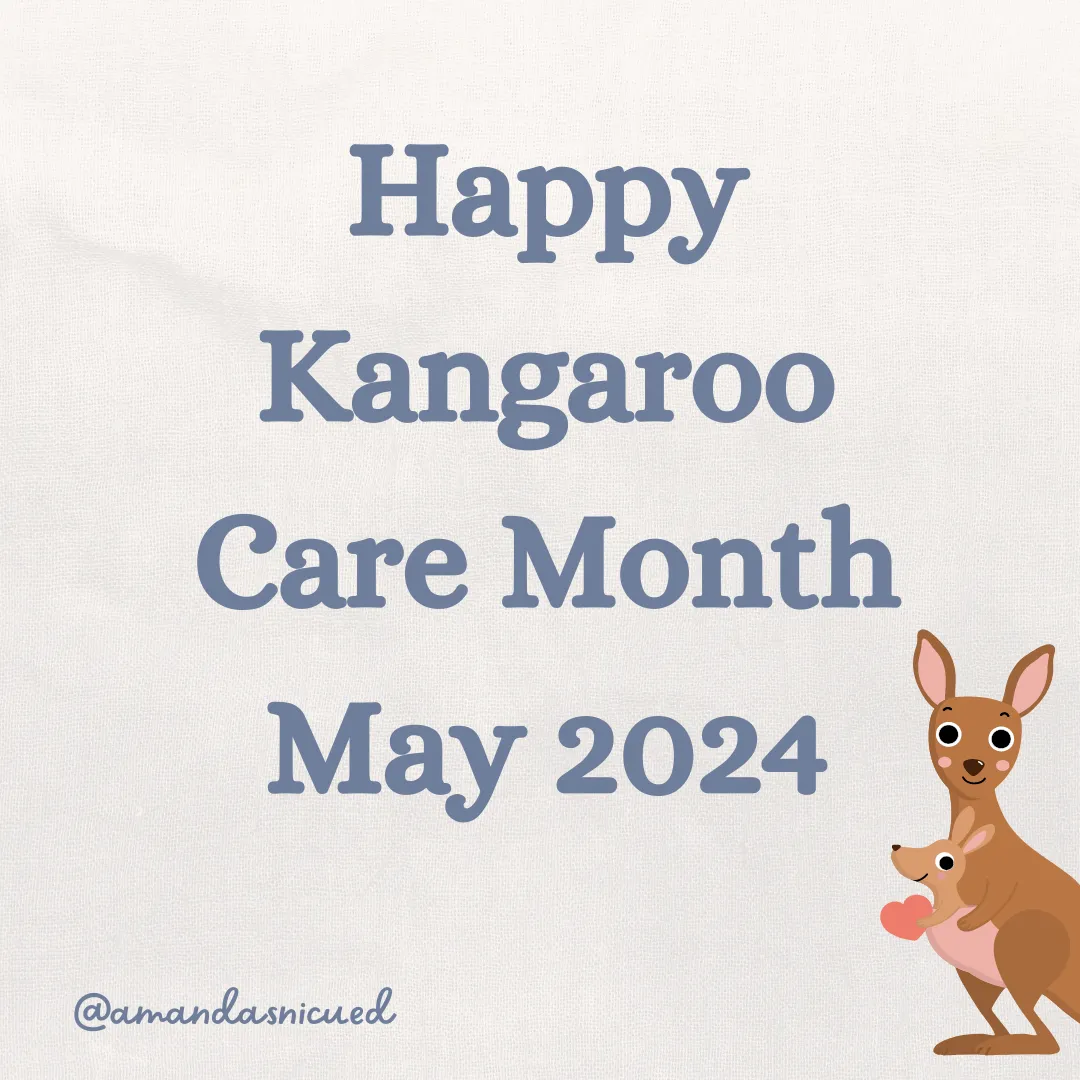
Benefits of Kangaroo Care
"Getting our precious patients up and out of bed and held by their loving parents is a nursing priority"
Happy Nurses Week! How are you celebrating? There's so much to be excited about this month. Not only is it Nurses Week, but we also have International Kangaroo Day coming up on May 15. Here in my NICU, we make it a month-long celebration. Do you do the same in your unit?
Kangaroo Care is amazing and not just because it is a nice thing to do but it is truly THERAPY for the baby. Getting babies held by their parents as soon as possible needs to be a priority for us as NICU nurses. I have had this thought the last few months, and in every patient population we know that being in bed for long periods of time is bad for you. Our muscles atrophy quickly. Adult patients are walking around the ICUs intubated and on ECMO because it is so important to get out of bed. I think it's the same with our babies (except they're not exactly walking around the unit). Getting our precious patients up and out of bed and held by their loving parents is a nursing priority! Does your NICU have a goal to get babies skin to skin by a certain timeframe? If so, what is it and what are your strategies for success? Let's all share with each other!
Happy Nurses Week! Get 15% OFF with Code "Nurse2024" at Checkout!
Let's review the evidence...
There's mountains of evidence to support skin to skin holding. Skin to skin has shown to support everything from bonding, to increasing moms milk production, thermoregulation, growth, supporting the microbiome, and more. If you're like me, I'm sure reading the evidence about WHY skin to skin holding is so important makes you feel even more excited and motivated to get those babies held by their parents. Let's talk about it!

Benefits for the Parents:
Parents with babies in the NICU endure a continuous state of emotional upheaval. Separation from their newborns is profoundly stressful and traumatic, impacting the social-emotional development, parental well-being, and overall mental health of all involved. However, facilitating early and frequent parental touch, particularly through skin-to-skin care (SSC), can significantly enhance the parent-infant relationship.
For both mothers and fathers, SSC fosters bonding, supports role attainment, and reduces stress and anxiety. This effect is attributed to the release of oxytocin, often referred to as the "love hormone," which plays a crucial role in establishing bonds between parents and infants. Oxytocin also acts as a potent anti-stress hormone, possessing anti-inflammatory properties and reducing fear and pain sensations. Its presence promotes trust, well-being, and can lower cortisol levels, consequently alleviating stress and anxiety.
Mothers with babies in the NICU are at a heightened risk of experiencing postpartum depression. SSC serves as a strategy to mitigate this risk and enhance overall well-being. It is emerging as a therapeutic approach for maternal depression and anxiety, as it reduces maternal (and neonatal) stress levels and improves maternal satisfaction. Additionally, continued SSC aids in physical recovery during the postpartum period.
By recognizing the profound benefits of SSC in the NICU, the entire NICU team can actively support parental well-being, promote healthy parent-infant relationships, and contribute to positive outcomes for both parents and infants alike.
Benefits for the Baby:
SSC plays a crucial role in stabilizing critically ill infants, supported by compelling evidence. Studies demonstrate significant improvements in heart rate stability, reduced occurrences of bradycardia, and decreased irregular breathing and apnea episodes with SSC.
Heart rate variability relies on the balance between the sympathetic and parasympathetic nervous systems. When held skin-to-skin by a parent, infants exhibit a more stable heart rate variability, likely due to the calming and comforting nature of the contact. Moreover, the inclined position during SSC activates parasympathetic nerves, resulting in lower stress levels compared to the horizontal position of being in an incubator.
SSC also contributes to the stabilization of respiratory patterns, reducing the incidence of apnea and bradycardia events. These events can disrupt cerebral autoregulation, leading to fluctuations in blood flow, intracranial pressure, cerebral oxygenation, and carbon dioxide tension, consequently increasing the risk of intraventricular hemorrhage in preterm babies.
Furthermore, SSC has been associated with higher oxygen saturations compared to care in an incubator, leading to fewer instances of desaturation events. This highlights the benefits of this simple yet effective intervention in promoting the physiological stability of critically ill infants.
The majority of infants held skin to skin are warmer than when they are in an incubator. Mother’s have an amazing ability to thermoregulate in response to the baby's temperature. Her breasts have the ability to increase in temperature if the baby is cold, and decrease if the baby is too warm. Fathers are not ability to increase and decrease their chest temperature the ways mothers do, but they are effective in keeping their babies warm.
Some studies show that SSC can even reduce the risk of nosocomial infection. In one study, being held skin to skin for >3 hours on a daily basis improved rates of breastfeeding and decreased nosocomial infections in very preterm infants. Another study found that preterm infants who receive SSC daily have a more mature oral microbiome compared to infants who do not receive SSC. One could consider the connection between the more mature microbiome and its role in protecting the newborn from infection and disease. When the mother holds her baby skin to skin, they are both exposed to a common pool of microorganisms. The mature immune system of the mother responds to these microorganisms by creating antibodies and leukocytes that are passed through her breastmilk to provide protection to the newborn and also help program the developing immune system. As we all know, breastmilk is so much more to the baby than their diet.
Early SSC promotes the initiation of prefeeding behaviors and supports breastfeeding and high milk production. The release of oxytocin during SSC positively affects the vagal nerve linked to GI function. Multiple studies have confirmed that preterm and term infants who receive SSC are more equipped to breastfeed compared to those who are not held skin to skin.
SSC also promotes growth and development. Infants held skin to skin have improved daily weight gain compared to those who were not held skin to skin. In addition, cognitive and motor development has more rapid maturation when NICU babies receive SSC. During SSC, babies experience better sleep and certain biochemicals are released which helps with the developing circadian rhythm of the infant. SSC allows smoother transitions from one state to another and helps the baby have deep restorative sleep maximizing brain development. Some studies even found that infants fall asleep quicker, have more clearly defined sleep states, have fewer arousals from sleep, and less crying when in SSC compared to when in an incubator.
SSC is the only intervention that positively impacts all five developing senses. The baby feels the warmth and skin of their loving parent supporting their sense of touch. When held by mom, they can smell moms breastmilk and they are exposed to either parents unique scent. They also get to hear their heart beat and feel the gentle movements of their breathing. When they look up they see their parents face. This is all a wonderful experience for the baby. SSC is truly therapy for the baby.
SSC also supports their motor system by allowing the baby to being in a more upright position on their parents chest. This allows their abdominal organs to shift away from the upper abdomen, supports their outward recoil of the chest, and enhances the efficiency of the diaphragm and pulmonary function.
SSC is a highly effective intervention in alleviating pain during procedures such as heel lance. Remarkably, SSC surpasses sucrose in reducing pain intensity. Given that preterm infants undergo numerous painful procedures, which can impair cognitive and motor function, it's imperative to integrate parental touch to provide comfort whenever feasible.
Facilitating parental holding or touch has demonstrated superior efficacy compared to interventions like oral glucose and opioids in pain reduction. Researchers have observed a decrease in hormonal stress markers, such as salivary and serum cortisol levels, in preterm infants during SSC.
As NICU nurses, it's essential to recognize SSC as a simple yet powerful tool to support infants during stressful situations, including invasive procedures, intubation, diaper changes, mechanical ventilations, and gavage feeding. Incorporating SSC into daily NICU care can significantly enhance the well-being and comfort of infants in the NICU.
Check out this Great Video about SSC from Dr. Jae Kim

I can't wait to hear about how you are celebrating skin to skin in your NICU! In my NICU we have a goal of 1000 hours of skin to skin during the month of May. Let's make it happen!
May 17th is Necrotizing Enterocolitis Day. We will be reviewing NEC in the next newsletter. Looking forward to talking to you then!
With love,
Amanda xoxo
Missed my other newsletters? Click here to read them!
Let's Study Together! Join my Certification Course
References:
Pavlyshyn, H., Sarapuk, I., Casper, C., & Makieieva, N. (2021). Kangaroo mother care can improve the short-term outcomes of very preterm infants. Journal of neonatal-perinatal medicine, 14(1), 21–28. https://doi-org.mlprox.csmc.edu/10.3233/NPM-200455
Sivanandan, S., & Sankar, M. J. (2023). Kangaroo mother care for preterm or low birth weight infants: a systematic review and meta-analysis. BMJ global health, 8(6), e010728. https://doi-org.mlprox.csmc.edu/10.1136/bmjgh-2022-010728
Vittner, D., & McGrath, J.M. (2023) Skin-to-Skin Contact Optimizes Outcomes for Infants and Families in Developmental Care of Newborns and Infants: A Guide for Health Professionals (3rd Ed). National Association of Neonatal Nurses
Hendricks-Muñoz, KD, Xu, J, Parikh, HI, . Skin-to-skin care and the development of the preterm infant oral microbiome. Am J Perinatol. 2015;32(13):1205–1216. https://doi.org/10.1055/s-0035-1552941

December 2023 Certification Review Webinar
NICU Certification Review


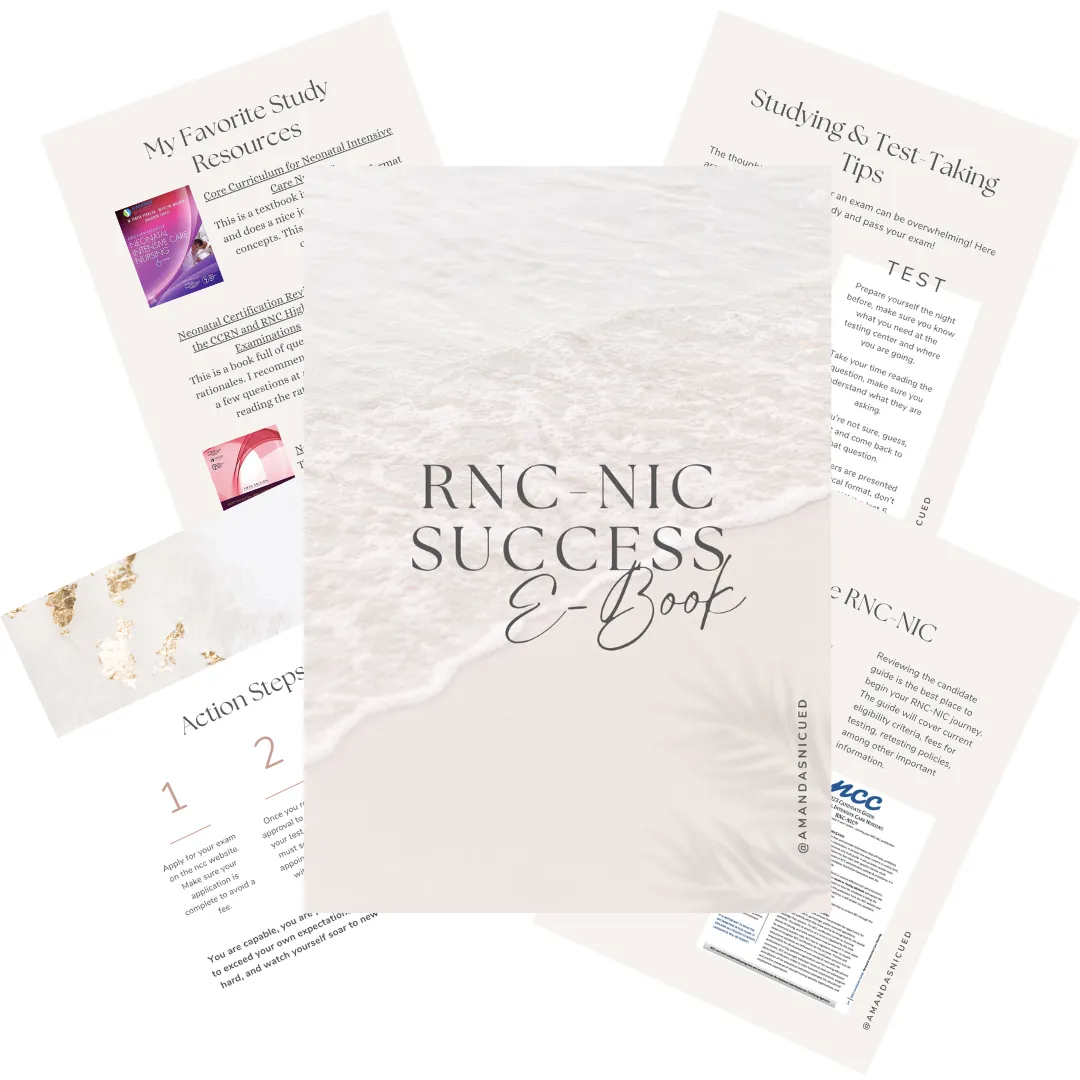
Ready to kickstart your journey to becoming a certified NICU nurse?
Look no further!
Grab my FREE E-Book packed with essential study and test-taking strategies for the RNC-NIC.
In the E-Book I give you the resources you need including the link to access the candidate guide, several types of books to study from, some of my favorite strategies, an outline of the content you should review, and a blank calendar for you to make your study plan!
Frequently Asked Questions About the RNC-NIC exam

What is the RNC-NIC?
The RNC-NIC is a competency-based exam that tests the specialty knowledge of nurses in the United States & Canada who care for critically ill newborns and their families.
The RNC-NICU is a nationally recognized certification that recognizes the registered nurse for their specialty knowledge and skill.
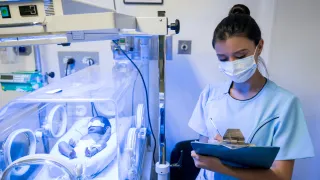
Who can take the RNC-NIC exam?
Nurses can take this exam after a minimum of two years experience in the NICU caring for critically ill newborns and their families.

Which books should I use?
I'm glad you asked! There are many excellent books to help you prepare for the RNC-NIC, I gathered ande describe each of them for you in my FREE e-book.
Is there a course to help me study?
Yes! Many hospitals host their own certification course and there are a few online courses. See my RNC-NIC test taking tips E Book for more information
What happens if I don't pass the exam?
If you don't pass the exam on your first try you can try again after 90 days. You will have to reapply after 90 days and pay a retest fee. There is no limit to the number of times you can take the exam (however a candidate can only sit for the exam twice per year).
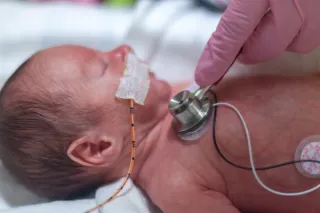
Can I make more money if I take the RNC-NIC exam and get certified?
Yes! Many hospitals provide a raise or a bonus for nurses with specialty certifications. Hospitals also typically hire at a higher base salary when nurses have a certification.

Find me @amandasnicued on these channels or Email me
hey nurses don't miss out
© Copyright 2024. AmandasNICUEd. All rights reserved. | Terms & Conditions | Privacy Policy Contact: [email protected]
